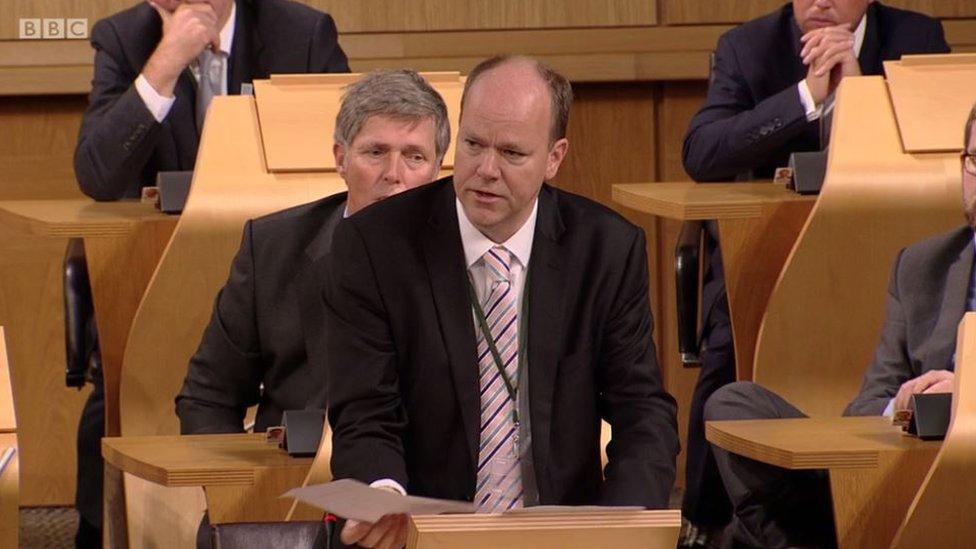MSPs to study impact of pay gap between men and women
- Published

Women working in Scotland earn an average of 6.2% less than their male colleagues
MSPs are to examine the gender pay gap in Scotland and how tackling it could boost the economy.
Research suggests women will not earn as much as their male counterparts until 2069, nearly 100 years after the Equal Pay Act was introduced in 1970.
Holyrood's economy, fair work and jobs committee will examine why women working in Scotland still earn an average of 6.2% less than men.
Ministers said they were committed to removing the barriers faced by women.
The difference between men and women's median hourly earnings for full-time work in Scotland fell from 7.7% in 2015 to 6.2% in 2016.
Studies show fewer women work in higher-paid sectors like technology, IT and engineering, and continue to be under-represented in senior management and leadership roles.
Despite 51% of workers in finance and insurance being female, it is the sector with the highest pay gap, at 29.9%. The committee cited UK government figures as showing that "equalising women's productivity could add almost £600bn to the economy" across the country.
'Very complex matter'
Convener Gordon Lindhurst said much had changed in the labour market since the 1970 legislation.
The Conservative MSP told the BBC's Good Morning Scotland programme that the inquiry, external aimed to be "open-minded" about how closing the gap could affect the economy.
He said: "The committee wants to hear from businesses and individuals who may be affected by this issue and we want to take their views and experiences on board, and look at how we can weave that into policy recommendations for the Scottish government.
"We want to encourage companies to look at the issue in perhaps a more positive way than sometimes is thought, and to see how this can be of benefit not just to the employees but also to the companies themselves.
"The committee is open-minded about this. We're interested in seeing how this can affect the economy - it's not a matter of presupposing the answer. It's a very complex matter - work patterns have changed since the 1970 Equal Pay Act was brought in, we've got remote working, internet working, we have flexitime, we have all sorts of things in which the world has moved on, and it's important to review matters and see how this all fits together."
Mr Lindhurst said the education system and the way people were brought into the workplace "may be key" to the inquiry.

Committee convener Gordon Lindhurst said work patterns had changed since the 1970 Act
Tricia Nelson, a partner at professional services firm EY, told the programme that it was "such a good thing" that the issue was being discussed.
She said: "In my own experience, you don't set out in your career thinking 'gosh, is there a gap?'.
"But the more experienced you become and as you progress through the years, you do start to think, 'is everything fair? Am I getting treated the same as everyone else?' And without the data and without the conversation we can't be bold for change and move the agenda forward.
"There is empirical evidence that the economy works better when women are a massive contributing factor to the workforce. And the more we can encourage organisations to look at the data and understand how they can proactively drive change the better.
"Certainly the work my colleagues and I do is about men and women having the conversation and being really open about this - there is a degree of unconscious bias, we know that, and in my experience when you start to talk about that things do change."
'Some way to go'
The Scottish government has said equality is "embedded" in its economic strategy and "at the heart of ambitions for a socially just and inclusive Scotland".
Employability Minister Jamie Hepburn told the BBC that the gap was "a long-standing issue", adding that "we still have some way to go despite having had an equal pay act for a considerable amount of time".
He said: "We have to start with the fundamentals. One of the things we're embedding in the school environment is the developing young workforce, external agenda.
"One of the things we can try and do through that is tackling some of the gender norms in terms of subject matter and in terms of areas of study that we see in schools, and going on into colleges and universities, which leads to gender segregation in the workplace.
"We know if we can better remunerate people in the workplace, if people are better respected in the workplace, then it's going to boost innovation and it's going to increase levels of productivity, which is a win for individual companies and a win for our overall economy."
- Published26 October 2016

- Published26 October 2016

- Published14 October 2016
